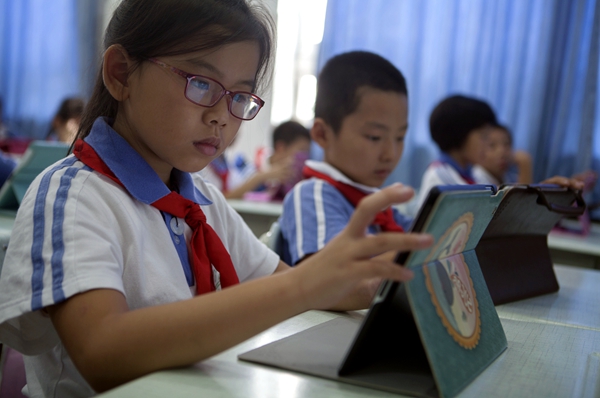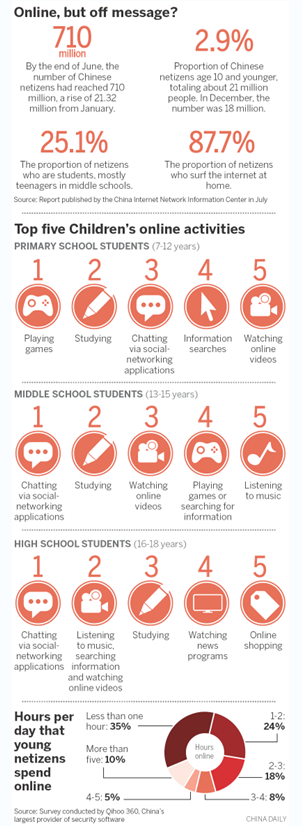Parents push to curb children's growing online obsession
Updated: 2016-08-30 07:35
By Cao Yin(China Daily)
|
||||||||
 |
|
Students use iPads during a class at Houhai Primary School in Beijing. Huo Jianbin / For China Daily |
Guo Jie, a judge and the mother of a 10-year-old boy in Sanming, Fujian province in southeastern China, understood Lyu's dilemma. She said her son used to disrupt mealtimes if he wasn't allowed to use a smartphone or tablet computer at the dinner table.
"Ke Ke (the boy's family nickname) was noisy and impatient before the dishes were served or once he'd finished eating. He always disturbed my mealtime conversations with friends and family, and I had to find a way to keep him quiet so I allowed him to watch online cartoons next to the table while I had supper with friends," the 37-year-old said.
However, when Ke Ke's behavior failed to improve, Guo realized that she was making the problem worse, and she was also troubled by some of the content available to her son online. She has now changed her approach.
"We cannot stop boys and girls going online because they were born in the internet era. What we can do, I think, is to provide them with a safer online environment and try to see their world through their eyes," she said.
Guo clearly remembers a case she presided over six years ago in a nearby town when a 14-year-old boy was murdered by two classmates after a dispute about surfing the internet.
"The child who died was from a wealthy family, and he asked his classmates to pay when he allowed them to use his home computer to go online. The boys didn't have the money so they argued. The consequences were fatal," she said.
"They ended their classmate's life by holding his head underwater, a technique they had seen online. The case reminded me how important it is to provide children with a safe online environment."
Yuan Yishi, who works for Qihoo 360 and specializes in online security for young people, said the company provides "green" software for children, which blocks harmful content, such as scenes of violence, and keeps them safe from online fraudsters.
"It's not just a problem for China. Protecting young netizens is a major task for every country in the world," he said. "For example, in South Korea children's online security is protected by policies and laws, we should also adopt that approach to keep our children safe."
Contact the writer at caoyin@chinadaily.com.cn
 |
- Erdogan says Turkey to fight IS, Syrian Kurdish militants
- ROK's ruling party offers to deploy nuclear-power submarine
- In photos: Searching for history along the Thames
- Bolivian deputy interior minister killed by miners: report
- In photos: Great Dorset Steam Fair 2016
- Historical towns before and after Italy's earthquake

 Groom and bride cycle their way to wedding
Groom and bride cycle their way to wedding
 The world in photos: Aug 22- Aug 28
The world in photos: Aug 22- Aug 28
 Daily life in Hangzhou, host city of 11th G20 summit
Daily life in Hangzhou, host city of 11th G20 summit
 Young pastry cook creates dough sculptures in China
Young pastry cook creates dough sculptures in China
 World's top 10 largest banks by assets
World's top 10 largest banks by assets
 Sand sculptures to welcome the G20 Summit
Sand sculptures to welcome the G20 Summit
 Historical towns before and after Italy's earthquake
Historical towns before and after Italy's earthquake
 College prepares 300 sleeping mats for parents
College prepares 300 sleeping mats for parents
Most Viewed
Editor's Picks

|

|

|

|

|

|
Today's Top News
Trump outlines anti-terror plan, proposing extreme vetting for immigrants
Phelps puts spotlight on cupping
US launches airstrikes against IS targets in Libya's Sirte
Ministry slams US-Korean THAAD deployment
Two police officers shot at protest in Dallas
Abe's blame game reveals his policies failing to get results
Ending wildlife trafficking must be policy priority in Asia
Effects of supply-side reform take time to be seen
US Weekly

|

|









